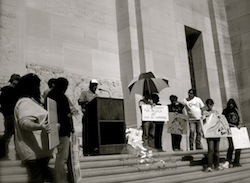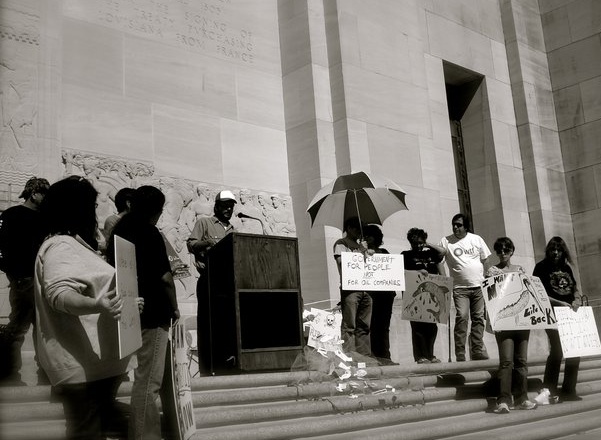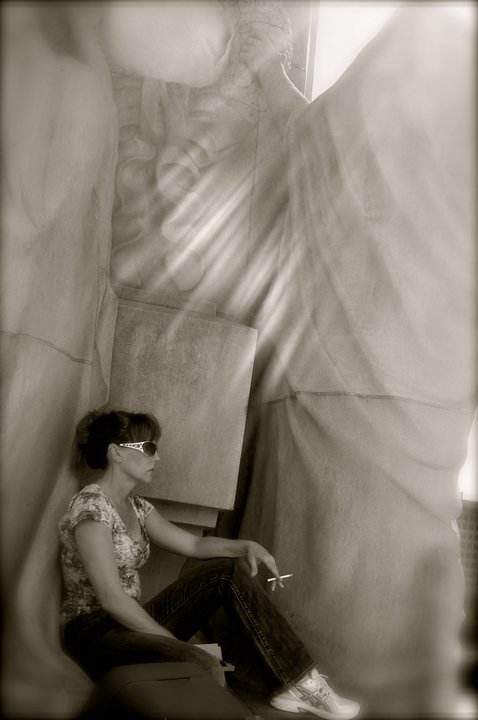Draw a line in the sand
 Speech by Karen Hopkins delivered at the Rally for Gulf Change. Baton Rouge, Louisiana, 10/30/10.
Speech by Karen Hopkins delivered at the Rally for Gulf Change. Baton Rouge, Louisiana, 10/30/10.
Good afternoon friends. Thank you for coming to hear the truth, share the truth and demand the truth! My name is Karen Hopkins, I have lived in Grand Isle for over 13 years and have worked for Dean Blanchard Seafood for almost 7 of those years. I love Grand Isle. I love the seafood industry and the fishermen I've had the privilege to work with over these years.
I am here because I am I've had enough of being lied to by our government, elected officials and big oil. I am tired of waiting for the media to report on things that actually affect me and my community! I am tired of being kept in the dark about things that affect the health and safety of the citizens of my country! Big corporations with big money are buying their way out of the legal ramifications attached to the injustices and crimes they've committed. I know that had crimes of this magnitude been committed by ordinary citizens like you and me or a small family business, we would have been bankrupted, tried, and convicted immediately! I am also here because I am terrified about the poisonous environment we will leave behind for our children and grandchildren. I am here to draw my line in the sand.
I've watched the havoc this tragedy has wrought upon the communities and lives of the Gulf Coast; people in my home town have become ill and no one can or will tell them why. My grandson who is 9 years old, became ill with a persistent "upper respiratory infection" shortly after oil hit the shores of Grand Isle. He has since moved "up the bayou" and has not had problems since. I've been diagnosed with severe depression and am on antidepressants and anti anxiety meds as well. I've had the complete blood work panels done with no VOC's detected [Volatile Organic Compounds are found in crude oil]. However, for some undiagnosed reason, my body is "shedding" vitamins and the vitamin panel, according to my doctor, presents the profile of a "severely malnourished" individual and I suffer from all the "classic" symptoms of toxicity. I now take two prescription multi-vitamins a day and 100,000 units of Vitamin D weekly.
Thankfully, I was given an oil detox program and have completed that portion of it with a noted improvement in my health. I still have more detox programs to undergo and believe that they are the only thing that will actually help me.
I've watched as my fishermen and their families have suffered financially and emotionally since the oil spill came to town. I've watched as brothers, cousins and neighbors became enemies because one's boat was put to work with the Vessels Of Opportunity program [which hired fishermen to do BP oil clean-up work] while the other's was not. I've watched as people from generational fishing and shrimping families were told by BP Claims and Ken Feinberg that they would not be paid due to "lack of documentation". I've even watched, as my boss, Dean Blanchard, the strongest and most fearless man I've ever known, put his head in his hands and cried because he did not know what to do to help the fishermen he loves so dearly. At first, I was heartbroken. I cried constantly. Now, I don't cry from despair. I scream with anger. I'm over the mourning and it's time for us to draw a line in the sand and tell them what we demand.

Rally for Gulf Change. Baton Rouge, Louisiana 10/30/10. Photo by Brandi Gascon.
I work in the seafood industry, yet I do not trust our government when they tell me the seafood is safe to eat. Seafood from the Gulf will never be on my dinner plate again. I live there. I see what is in the water. I know what they put there and I know what they’ve not removed. If we, on land are sick, then imagine what the sea life and sea birds are suffering! I've spoken to fishermen and shrimpers who have been out there and continue to fish out there because they have no choice. They tell me what they see. People, it's not algae blooms! It's not naturally caused lack of oxygen! It's oil, dispersed oil, dispersant. It’s poison!
Cherri Foytlin, Drew Landry, Holt Webb, Ricky McKnight and I traveled to Tampa, Florida on the 18th of this month to attend the 20th anniversary of "Clean Gulf", which took place on the 19th & 20th. How many of you have ever heard of this convention? After all, it's been going on for 20 years now!
Among the sponsors of "Clean Gulf" this year were, BP, ES&H and Nalco. How many of you have ever heard of them?
A training workshop which we all hoped to attend, sponsored by Nalco, the manufacturer of Corexit, entitled, "Dispersant Application & Efficiency", was cancelled due to the prospect of there being protestors in attendance.
We were able to hear speeches from many people, including Michael Utsler, the Chief Operating Officer of the BP Gulf Coast Restoration Organization, Rear Admiral Mary E. Landry, Commander of the Eighth Coast Guard District, headquartered in New Orleans, Deputy Director Walter D. Cruickshank, Ph. D., with the Bureau of Ocean Energy Management, Regulation and Enforcement (formerly known as Mineral Management Service), Roland Guidry, the Louisiana Oil Spill Coordinator for the State of Louisiana, through the Dept. of Public Safety and Corrections, Brandi Todd, the Federal On-Scene Coordinator for the EPA's Region 6, which encompasses New Mexico, Texas, Oklahoma, Arkansas and Louisiana. I don't recall hearing from anyone with the EPA who represented Region 4, which includes Mississippi, Alabama, Georgia and Florida.
I watched these experts and learned what we must fight against. I realized for the first time ever how almost insurmountable it would be. I took notes and listened to big oil representatives and oil spill clean up contractors and retired former Coast Guard brass, who are now either employed by the first two or hold appointed office in several government agencies. I saw them pat each other on the backs and applaud their incompetent and nonexistent efforts and regulations to prevent oil spills and nonexistent efforts and regulations to clean up oil spills. I held my tongue until I became physically ill with the effort!
Thankfully, with the help of my colleagues and my husband, Ricky, I was able to find the strength to complete the task at hand. After all, what good would I have been to you had I disrupted the conference and been removed?
The knowledge gained from this experience has compelled me to share with you this story of a nightmare which began a very long time ago.
Karen Hopkins at the Rally for Gulf Change, 10/30/10. Photo by Brandi Gascon.
This is an excerpt from a story which was published in the June, 2004 edition of National Geographic Magazine.
"Below more than a mile of ocean and three more of mud and rock, the prize is waiting. At the surface a massive drilling vessel called the Discovered Enterprise, strains to reach it. It's the spring of 2003, and for more than two months now the Enterprise has been holding steady over a spot 120 miles southeast of New Orleans in the Gulf of Mexico. The ship is driving a well toward an estimated one billion barrels of oil below the seafloor - the biggest oil field discovered in the United States territory in three decades.
The 835 foot Enterprise shudders every few minutes as its thrusters put out a burst of power to fight the strong current. The PA system crackles, warning of small amounts of gas bubbling from the deep Earth. And in the shadow of the 23-story -tall derrick, engineers and managers gather in worried knots. "We've got an unstable hole, " laments Bill Kirton, who's overseeing the project for the oil giant, BP.
The drill, suspended from the Enterprise’s derrick through a swimming-pool-size gap in the hull, has penetrated 17,000 feet below the seafloor. Instead of boring straight down, it has swerved more than a mile sideways, around a massive plume of rock salt. But now, with 2,000 feet to go, progress is stalled. Water has begun seeping into the well from the surrounding rock, and the engineers are determined to stem its spread before drilling farther. Otherwise, the trickle of water could turn into an uncontrolled surge of crude. "There's a lot of oil down there wanting to come out," says Cecil Cheshier, a drilling supervisor, after struggling all night with an unruly hole. "You can cut corners and take chances - but that could cost you a lawsuit or cause a spill into the Gulf of Mexico, and then deepwater drilling gets shut down."
The troubled well is just one of 25 that BP plans to drill in the giant field, called Thunder Horse, which sprawls over 54 square miles of seafloor.
Oil Companies are searching for new supplies and braving high costs, both human and economic. Making gambles like Thunder Horse and venturing into West Africa and Russia, they are still finding oil in quantities to gladden a Hummer owner's heart. But in the end the quest for more cheap oil will prove a losing game: Not just because oil consumption imposes sever costs on the environment, health, and taxpayers, but also because the world's oil addiction is hastening a day of reckoning."
Can you imagine what would have happened, what decisions would have been made, had this reporter not been on this rig?
Now, let's jump ahead to an articled published by Corp Watch, in May of 2010, a non-industry analysis of what went wrong with the Discovered Enterprise.
"Thunder Horse had a near disaster in 2005, when a faulty control system opened valves and allowed water to flood into the hull of a drilling platform there. The multibillion dollar platform almost sank. BP spent months fixing equipment damaged in the flood.
Equipment failure was also to blame in the case of the Discovered Enterprise, the rig that ran into trouble in 2003 when the "riser", the pipe down to the seafloor, snapped in two. That left the Enterprise floating free, with no immediate way to control the well sitting on the seafloor more than a mile below. That well, investigators later concluded, had the potential to spew more oil in one week than was spilled in 1989 by the Exxon Valdez.
Catastrophe was averted in the Discovered Enterprise case because, unlike at the Deepwater Horizon, the well's "dead-man switch" was triggered when the riser broke. A powerful contraption known as a blowout preventer sheared off the pipe and sealed off the well. Some 2,450 barrels of drilling fluid inside the riser spilled into the Gulf, but the well itself was secure.
Today, the Discovered Enterprise is located at the site where the Deepwater Horizon sank, sucking up oil from the still-leaking well through a special tube.”
This is an industry analysis published by Offshore Technology, no date shown.
"In 2005, the Thunder Horse platform was severely disrupted by a hurricane. The floating platform was due to reschedule oil and gas production by the end of 2008. However, following a failure during pre-commissioning checks, there was a need to repair and replace components in the subsea system. The subsea equipment had remained in a cold state since the 2005 hurricane and it could not perform the intended high pressure and high temperature service."
Do you believe we're being told the truth? Do you believe we're being given full disclosure and access to the records involving this tragedy?
Now it's your turn to put your foot down, draw a line in the sand and demand to know the facts. If you do nothing about your lot in life, then expect exactly that in return: nothing.
Thank you for listening to what I and the others here have to share.
